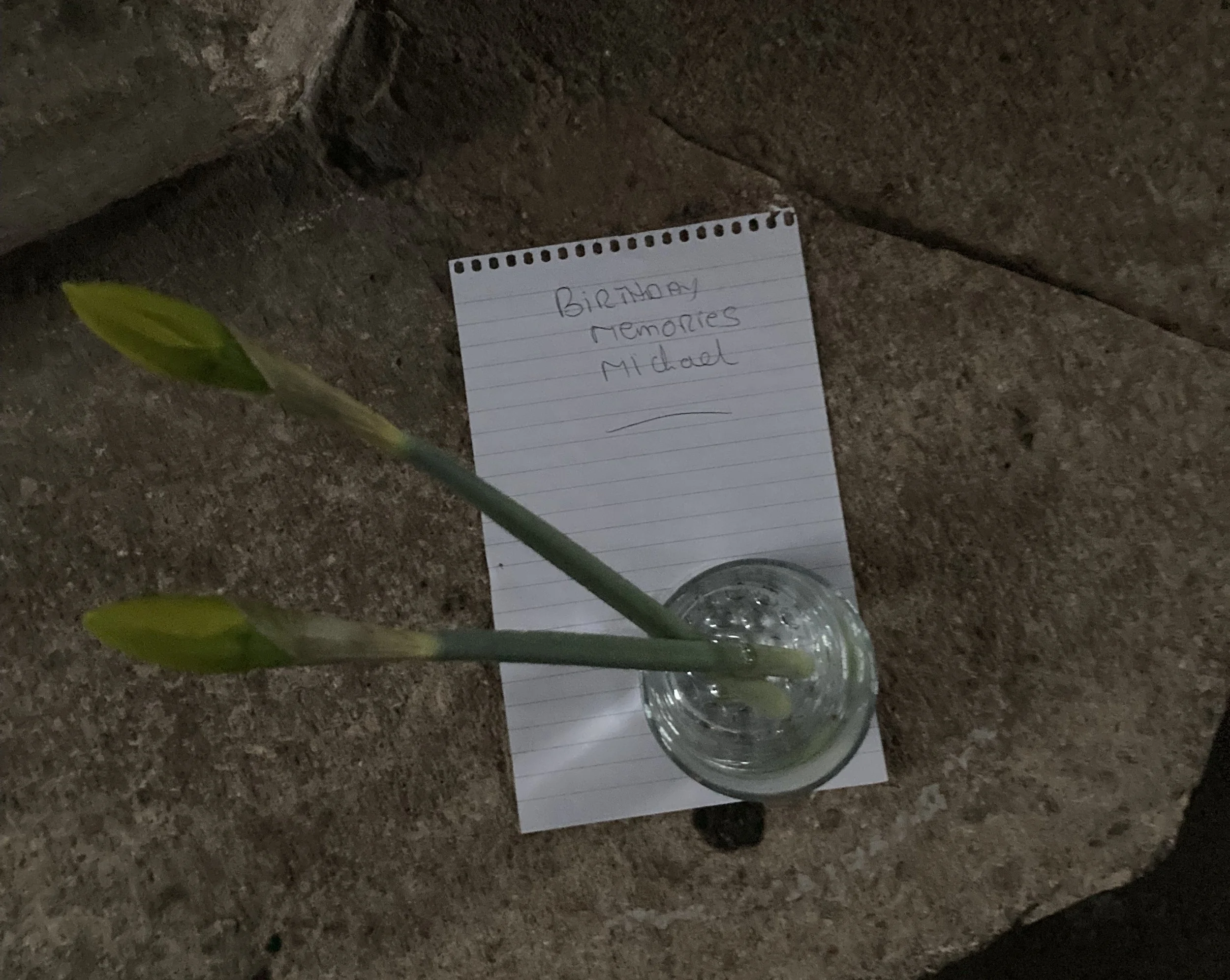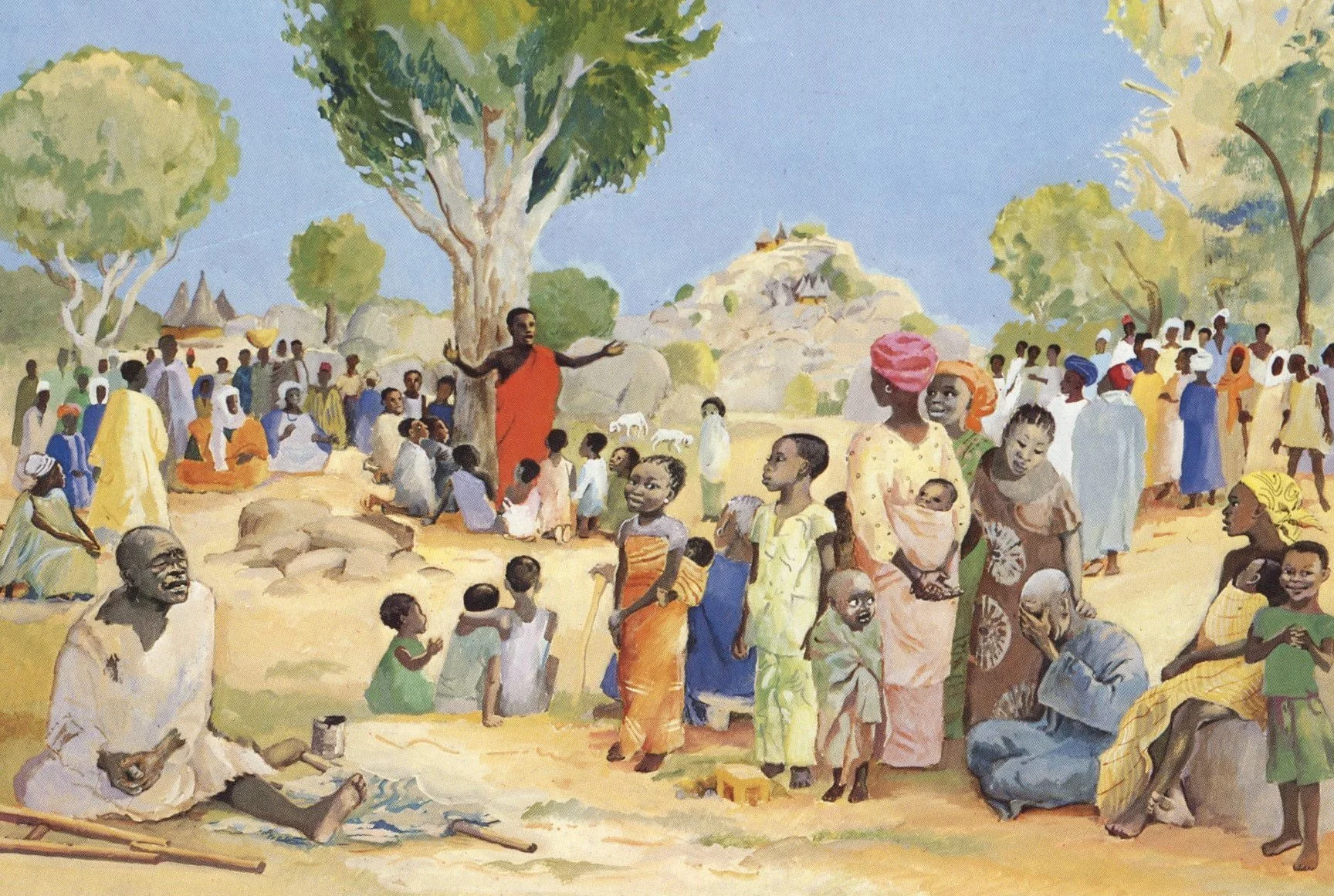Two daffodils
I’d just finished leading Morning Prayer. Everyone else had gone and I was packing away the livestream when I heard footsteps behind me. I turned to find Jane (not her real name), a well-known figure in the town - one of those who start queueing outside the community fridge at least an hour before it opens.
“Is there a vase I could put these in?” she asked. It would have been her recently departed brother’s birthday that day, she explained, and she wanted to leave them in church. I found a glass and put some water in it. Her face lit up with joy. She was so grateful. Tearing some paper out of a pad, she wrote something in pencil and put two daffodils in the water beside it. Two daffodils, mind you, not two bunches.
When she’d gone, I went over to the font where she’d left both paper and flowers. The message was long in loss and love though short in words. Just three of them in fact: “Birthday memories, Michael”…
“Blessed are you who are poor,” said Jesus to those thronging about him. “Blessed are you who are hungry, who weep, who are excluded.”
Jane ticks all four boxes.
Those phrases come from Luke’s gospel, though in fact, when it comes to lists of these so-called ‘Beatitudes’ (from the Latin ‘beatus’ meaning blessed or happy) we’re probably more familiar with Matthew’s.
Matthew has nine beatitudes, Luke only 4. But after his four ‘beatus’ phrases, Luke includes four ‘Woes’. Woe to you who are rich, full, laughing, popular… There’s a touch of the Old Testament prophet in this, shades of the Jeremiah curse and blessing passage (17. 5-10) which the lectionary also gave us this morning.
Another significant difference between the two gospels is this: Matthew, wanting his readers to see Jesus as the new Moses, giving his people a new Law from God, just as Moses had done on Mt Sinai, positions Jesus on top of a hill. In fact the Beatitudes in his gospel form part of that collection of sayings we now know as the Sermon on the Mount.
But Luke? It’s so interesting. Luke does the complete opposite. Instead of placing Jesus ‘up’ to utter these incredible phrases, he brings him down: “Jesus came down with them and stood on a level place …”
Again and again throughout his gospel, Luke shows us a Jesus who levels up (to use a phrase from contemporary British politics) by bringing those on the edge (women, Gentiles, lepers, tax collectors) centre stage, by talking with them, eating with them, depending upon them as his inner circle. And in today’s passage, he brings Jesus to a level place to speak about a radical reversal of human values.
He tells us that those swarming round Jesus have come from all over – his disciples from up north, others from the south and even from Jerusalem, others still from the Gentile cities of Tyre and Sidon. There were people there who were sick, mentally unwell, needy for a whole host of reasons, and therefore open and vulnerable to hear what Jesus might say, what he might have to offer to them, even them…
A Cameroon painter imagines the crowds and Jesus addressing them…
And then Jesus speaks. Unlike Matthew’s “Blessed are the poor in spirit… Luke’s Jesus speaks not in general terms but eyeballs those around him and speaks directly to them: “Blessed are you who are poor.” And Luke doesn’t spiritualise this as Matthew does: it’s not the “poor in spirit”, not those who “hunger and thirst after righteousness” but simply those who are poor, materially poor, those who are hungry, because they don’t have enough to eat.
Unfortunately, the extraordinary phrases Jesus comes out with are now so familiar that it’s hard to get a sense of their original shock value. But ‘blessed are you who are poor, blessed are you who are hungry, blessed are you who are weeping, blessed are you when you’re unpopular, ostracised….’
Seriously?
The world in which we live does not regard the poor, the hungry, the weeping and the excluded as blessed. Nor does it generally regard those with plenty of money in their pockets, food in their fridges, laughter in their lives and affirmation from those around as needing to watch out. But that’s what Jesus says in the 4 ‘woes’ which follow. This is astonishingly upside-down stuff, a radical reversal of the way our world looks at things.
His words would certainly have shaken any well-to-do clergy who’d come out from Jerusalem, would have challenged any other well-fed professionals from the city’s leafy suburbs. But how would these Beatitudes have sounded to the sick person in the crowd who’d spent all their money on medical bills and whose insides were clapping together with hunger? How would they have sounded to the leper kept apart from home, family, synagogue?
How would they sound to Jane? Like heaven on a stick!
How you hear these Beatitudes and Woes, depends on how you are when you hear them.
Which of them especially makes your heart leap a little this morning? And which makes your toes curl, your head lower a little?
The way things are now is not always how they will be, Jesus says. With me everything changes. God’s kingdom brings a great levelling. A levelling down as well as a levelling up. There is hope for those who feel empty. There is also hope for the overfed. There is hope for the ridiculed as well as for those whose egos are sky-high. There is hope because there is another way. God’s way. Make God’s values your priority and everything else will fall into place and you will be blessed.
From a sermon preached in Norwich Cathedral, February 2025

